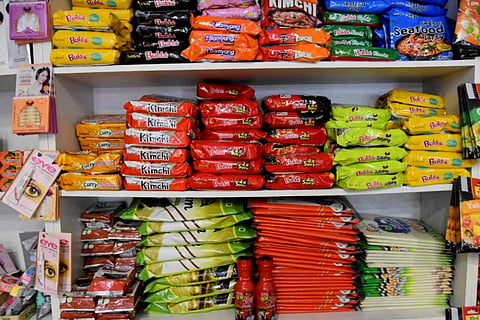

Ao Anishi is not something you’ll find in most grocery stores in Bengaluru. Broad taro leaves are plucked and fermented for days, before they are pulverised into a paste and baked overnight. The soft, blackened dough is then dried into a small puck that’s packed with flavour, to be used in cooking, as a condiment, or simply chewed on its own. Anishi, known for its use among the Ao Naga community in Nagaland, is burnt slightly and then crushed into a powder, one that’s routinely added to dried pork in a traditional dish from the state. “It gives a smoky flavour,” said Chinaoshim Hongvah, 33. “Even if the meat is not smoked, you add this, and it gives a smoky effect.”
Chinaoshim owns Seven Sisters, a shop that specialises in indigenous ingredients, snacks, fresh vegetables, and so much more from the north-eastern states and beyond. Shelves are filled with sealed bags of dried black jelly and kanglayen mushrooms, alongside shredded bamboo shoots and black Nagaland sesame seeds. Stacks of Buldak ramen, Shin ramyun, sheets of crispy seaweed and Dingwang snow cookies sit side by side; and dried, smoked and fermented fish come in all shapes and sizes.
To look at the range of supplies at the small shop in Ejipura — one of two locations, the second being in Kammanahalli — it’s no surprise why Chinaoshim, who is from Manipur, decided to start his own business. His goal, he said, was to bring difficult-to-find products to Bengaluru shoppers. While working as a makeup artist and manager at MAC in Bengaluru, he started to notice that his friends, who had also moved to the city from north-eastern states, had a hard time finding ingredients that provide the unique taste and texture of their style of cooking. According to The Indian Express, over the years, Ejipura has turned into a hub for young migrants from the north-eastern states, who move to cities like Bengaluru for greater job prospects, while attempting to maintain a semblance of home and community in these new places. Chinaoshim began sourcing stocks from back home, and immediately received overwhelming demand and support from friends and well-wishers. He eventually went into the business full time, and last year, they moved to their current (and bigger) location in Ejipura, a space that’s allowed him to grow the business.
But it was another source that has truly created a near cult following for Seven Sisters. Last year, Chinaoshim signed up on Instagram and the response, he says, has been massive. They currently have over 3,600 followers who watch for their posts on giant hornet larvae, spicy chicken jerky, shinju (a Manipuri preparation of vegetables), roasted perilla powder, dry fish and bhut jolokia, and so much more. “That really changed the business,” Chinaoshim said. He soon found an audience among those who weren’t familiar with the diversity of indigenous vegetables, seeds, snacks and dried produce he was selling at his shop. Many customers also seek advice on how to cook with products like bamboo shoots, which Chinaoshim suggests adding to chicken or pork, as they do in Manipur and Nagaland.
“We get products that you don’t get everywhere on the market,” he said. Aside from the north-east states, he also sources supplies from Kalimpong in West Bengal. Chinaoshim’s range also includes a number of Korean, Tibetan, Nepali and Bangladeshi supplies. From Myanmar, he stocks long lolly sticks holding sweet, sticky, jammy clumps of pureed preserved fruit. Sacks of red and white sticky rice are placed on the floor, perfect for sushi. On one shelf sits a small stack of bags containing chili powder, made using the nine-inch-long Sirarakhong chili that’s grown only in a village of the same name in Ukhrul district in Manipur. Seven Sisters also stocks chocolate brands like Hill Wild, and Rumbling Spoon, which is known for their selection of Naga-style pickles.
After moving to the new shop, Chinaoshim also started making pickles with bhut jolokia, axone, pork, chicken, and shredded buff in a traditional north-eastern style. It’s now become one of the top sellers of the shop, he said.
Fresh vegetables are also flown down to Seven Sisters, including blossoms of organic ginger flowers, fiddlehead ferns with their distinctive curled tops and squat eggplants in purple and bright green.
On a recent Friday afternoon, as I purchased a bag of surprisingly citrusy wild pepper and some of the Sirarakhong chili powder, Chinaoshim handed me a squat bundle of leaves tied together. These were Naga coriander, he said. Though it looked nothing like the coriander leaves you’d generally find in city markets, their fragrant smell confirmed Chinaoshim’s words. The roots were still attached at the base, something that he had specifically requested from the supplier, so that people could plant the leaves in Bengaluru. Perhaps, that way, a bit of the north-east will be easier to find here in the future.